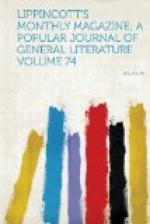“Of course I would, Uncle Jabez,” said Mr. Birchard kindly, but with an amused twinkle in his eyes. “You take your own time: it’s only just struck nine, and there’s no hurry at all.”
“Supposin’ I was to tell him that one about my first wife?” said the old man presently, and with an inquiring look around the circle.
Several heads were nodded approvingly, and Mr. Crumlish said, “The very one I’d ‘a’ chosen myself if you’d ast me.”
Thus encouraged, Uncle Jabez, with a sort of deliberate promptness, began: “We married very young, Lavina and me,—too young, some said, but I never could see why, for I had a good farm, with health and strength to carry it on, and she was a master-hand with butter and cheese. At any rate, we thriv; and if we had plenty of children, there was plenty for ’em to eat, and they grew as fast as everything else did. She wasn’t what you’d fairly call handsome, Lavina wasn’t, but she was pleasant-appearin’, very,—plump as a pa’tridge, with nice brown hair and eyes and a clean-lookin’ skin. But it was her smile in particular that took me; and when she set in to laugh you couldn’t no more’ help laughin’ along with her than one bobolink can help laughin’ back when he hears another. She was the tenderest-hearted woman that ever breathed the breath of life: she couldn’t bear to hurt the feelin’s of a cat, and she’d go ’ithout a chicken-dinner any day sooner’n kill a chicken. As time passed on and she begun to age a little, she grew stouter ‘n’ stouter; but it didn’t seem to worry her none. She’d puff and blow a good bit when she went up-stairs, but she’d always laugh about it, and say that when we was rich enough we’d put in an elevator, like they had at a big hotel we saw once. It would suit her fine, she said, to set down on a cushioned seat and be up-stairs afore she could git up again. Now, you needn’t think I’m wanderin’ from the p’int,” and Uncle Jabez looked severely at Mr. Dickey, who was manifestly fidgeting. “All you folks that have lived about here all your lives knew Lavina ’ithout my tellin’ you this; but Mr. Birchard he’s a stranger in the neighborhood, and it’s needful to the understandin’ of my story that he should know just what sort of a woman she was,—or is, as I should say.”
Mr. Dickey subsided, while Mr. Birchard tried to throw still more of an expression of the deepest interest and attention into his face. He must have succeeded, for the old man, going on with his story, fixed his eyes more and more frequently upon those of the young one. They were large, gentle, appealing blue eyes, with a mildly surprised expression, which Mr. Birchard found exceedingly attractive. Whether or not the fact that the youngest of Uncle Jabez’s children, a daughter, had precisely similar eyes, in any way accounted for the attraction, I leave to minds more astute than my own.




